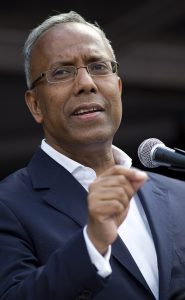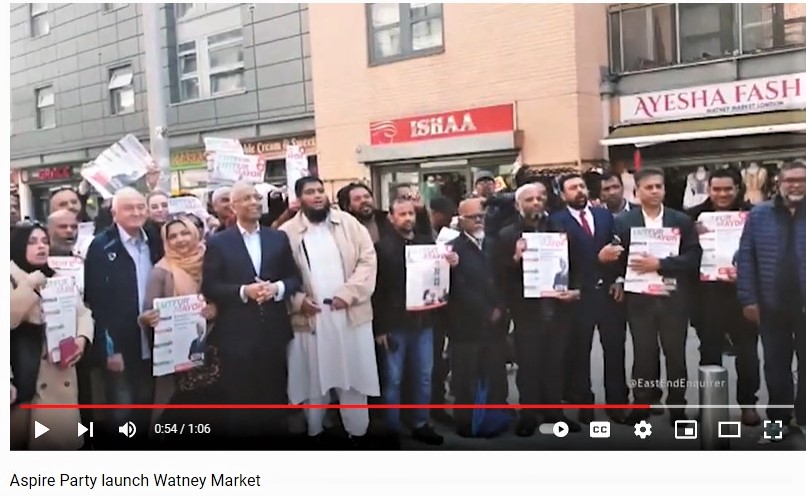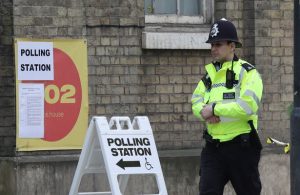Lutfur Rahman is back: Ex-mayor banned for ‘corrupt and illegal practices’ re-elected in London’s Tower Hamlets
Sounds like we have gone backwards. The man should have been banned for life, and also prosecuted. The failure of the CPS and Metropolitan police to do so in 2015 would be a mystery, if there were not many other instances of malpractice, corruption and plain inefficiency in law and order.
From Sky News and other sources.
 Lutfur Rahman was removed as mayor of Tower Hamlets in 2015 after an election court found him guilty of corrupt and illegal practices, although he faced no criminal proceedings.
Lutfur Rahman was removed as mayor of Tower Hamlets in 2015 after an election court found him guilty of corrupt and illegal practices, although he faced no criminal proceedings.
But as the results of local elections came in on Friday, Mr Rahman won back the role.
Mr Rahman, standing for the Aspire party, claimed he had “a bigger mandate than I had in 2014 or in 2010” and pledged to “rebuild” the borough.
Back in 2015, election commissioner Richard Mawrey made a series of findings against Mr Rahman, saying they had revealed an “alarming state of affairs” in the east London borough. Four voters had taken legal action against Mr Rahman, making a series of allegations, including “personation” in postal voting and at polling stations, which involves people illegally voting on others’ behalf. There was plenty of other corruption as well.
Readers don’t need to know exactly which Aspire Councillors won which wards; but you can see from this list compiled by local activist the East End Inquirer that every candidate was of Bangladeshi background, all bar one was male, and I’ll take the Inquirers word for it as he has closer personal knowledge that they come from the more conservative quarters of that community who are one third (32 percent) of the population of Tower Hamlets.
As he or she puts it they are
“‘the uncles’, the elderly very conservative (small c) Bangladeshi men who wield power in their communities and seem to still control its politics. . . no Somali candidates. There are no West Indian candidates. There are no European candidates. There are no Commonwealth candidates. As far as we are aware there are no candidates from the LGBTQ+ community, but we would be extremely surprised if there were.” I won’t say no Jewish candidates as the Jewish presence in Tower Hamlets these days is miniscule, but no English candidates either although I believe they have one or two activists.
There is a bit of video here (I won’t embed it) where The Inquirer has spliced bits of the Aspire Party event in Watney Street market (my late cousin ran a stall down there in the 80s; the last time I was there I was the only European face until I went into the library, sorry Ideas Store) with Lord Hayward in the House of Lords reading out the guilty verdicts of the electoral petition judgement. At 54 seconds (below) you will hear the cheers of Allah Akbar.

Their campaign this last 5-6 weeks has been on familiar lines. This is the Daily Mail from 3rd April.
Footage has emerged of a key campaigner working for Lutfur Rahman, who became Britain’s first elected Muslim mayor in 2010, apparently urging fellow activists to ‘collect’ ballots from elderly and sick voters.
… a video posted on social media shows one of his supporters, Mohammed Abdus Shukur, 58, telling a packed meeting of activists last September to ‘collect’ votes for Mr Rahman.
In the video, Mr Shukur, a professional carer, says in Bengali: ‘In Tower Hamlets, there are 3,500 carer brothers and sisters. If 1,000 carer brothers and sisters actively work in this way and if every brother and sister carer collects 20 votes each, then from our carers 20,000 votes can enter Lutfur’s [ballot] box.’ He adds: ‘Can you all not collect 20 votes per head? I give you an oath, as an adviser, I will collect 1,000 votes.’
Last week Communities Minister Kemi Badenoch warned the Metropolitan Police and the Electoral Commission of possible fraud in polls next month in Tower Hamlets. Campaigners are not allowed to fill in or collect others’ postal votes, to prevent ballot papers being used fraudulently.
Mr Shukur’s legal representative said that by ‘collecting votes’, their client meant ‘encouraging the audience to go out campaigning to persuade others to vote in a certain way’. Mr Shukur’s comments were investigated by the police who did not pursue the matter, they said.
Tory Lord Hayward highlighted the video of Mr Shukur in the Lords recently, saying: ‘On four occasions during that meeting, different people do not refer to campaigning for votes, but repeatedly use the word “collect”
The police did at least take the threat (as happened in previous elections) of intimidation at the Polling Stations seriously. My London News reports
The Metropolitan Police officer stood outside the polling station Bigland Green Primary school in Shadwell told MyLondon he was on the lookout for “fraud and bribery.” Patrolling the strip of concrete from the entrance to the yellow and black tape, marking the ‘exclusion zone’ campaigners were not allowed to enter, he was taking his responsibilities seriously. “We want to make sure nothing happened like did before,” he said.
MyLondon spoke to councillor Andrew Wood who has been cycling around the borough monitoring behaviour at different polling stations.
“As people get close to the polling station, sometimes it’s obvious that they’re going to vote and then people will congregate around with them,” he said, “they will try and get them to vote for candidate x or y. I saw that just on my bicycle on the a way here; someone was standing around the corner from [the station speaking] to this lady [and] obviously telling her where to put a vote. That’s not illegal, but the issue will be; is the behaviour of the people concerned friendly? Is it approachable? If it is, that’s fine. But if it’s a bit intimidating, then then it’s not fine.”
Wood pointed out that what constitutes “intimidation” is subjective and varies from person to person. However, he claimed he had been contacted by some voters telling him they were scared to vote in the past.
“People have actually called me to say, ‘I don’t feel safe to vote because there’s this big crowd of people outside the polling station,’” he continued, “there was intimidation last year, so there are definitely some people who do feel intimidated, but it also depends on their physicality and whether they think they can take care of themselves or not.”
 Wood was concerned that some of the policing was better in some areas than others: “If I was the police officer, I’d actually be standing at just inside the gate. So if I saw campaigners getting a little bit too close I’d just stare at them. . . at other stations I went to you later the police were just sat inside. I’m more worried about behaviour outside than I am inside.”
Wood was concerned that some of the policing was better in some areas than others: “If I was the police officer, I’d actually be standing at just inside the gate. So if I saw campaigners getting a little bit too close I’d just stare at them. . . at other stations I went to you later the police were just sat inside. I’m more worried about behaviour outside than I am inside.”
Wood explained that officers are supposed to be checking whether voters are being intimidated on their way into the polling station, but also that people aren’t incorrectly voting on behalf of others.
However, Aspire candidate Ana Miah said he felt some of the police’s actions had been unfair in some instances; “the police presence has been fine, but in some places it was a bit harassing.
There is a lot of money at stake in ruling Tower Hamlets. The history was of poor working class and immigrant communities, and statistically I would say the majority of the borough is of recent immigrant heritage. But the financial district of the City of London has been steadily moving east, and now the Isle of Dogs, (or Docklands, what was once London Docks, which are now at Tilbury in Essex) is as big as the square mile, probably more wealthy, and there is A LOT of money involved.